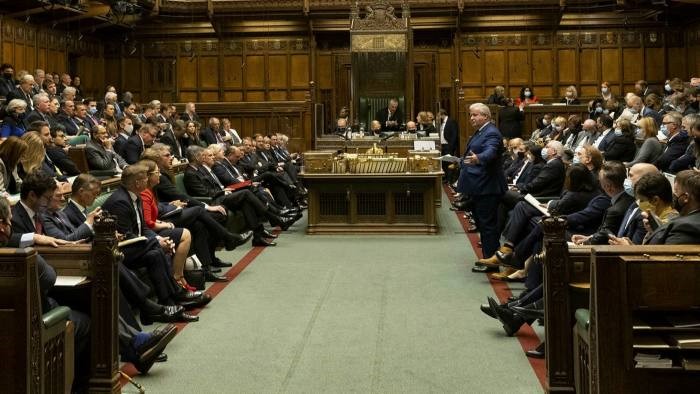© Roger Harris/UK Parliament.
Like everything else, public health measures have become politicised during the Covid-19 pandemic. Broadly speaking, those on the left tend to support lockdowns and mask-wearing, while those on the right worry more about the impact of these measures on the economy and civil liberties. This division is starkly illustrated by the ‘face mask divide’ in the House of Commons during Prime Minister’s Questions.
If it’s any consolation, this isn’t the first time that disease has been politicised. In 1720, a major plague outbreak occurred in Marseille, leading to a heated debate in England over quarantine measures. While the Whig government favoured strict quarantine to prevent the plague from reaching England, their opponents complained that this would undermine traditional English liberties. Government critics even claimed that the plague was not contagious, meaning that quarantine was unnecessary or even dangerous. Like today, public health policies and even medical beliefs were partly determined by politics.
It is easy to see why the government was concerned. The London plague of 1665 had killed something like 100,000 people, and the Marseille outbreak of 1720 showed that the disease had not gone away. In response, Parliament passed a Quarantine Act, which came into force in 1721. The Act set out strict quarantine measures for ships that might bring the infection from abroad. It even gave King George I powers to establish ‘lines’ – guarded perimeters – around infected towns and cities if the plague reached England. Those who violated quarantine were liable to execution.
The quarantine legislation of 1721 aroused a major controversy between the government and those who accused it of introducing despotism. Opponents made much of the fact that the Act was inspired by measures adopted by absolutist France. Rumours circulated that it would be used to trample on English liberties and target the government’s domestic enemies. Among other things, the legislation empowered the government to use regular soldiers to guard infected areas as a last resort, a measure which some feared would result in a ‘Dragoon [being] planted at every one’s Door’. The inhabitants of infected houses, it was said, could now be forcibly removed, whether they were healthy or not.
Critics of the Quarantine Act sought to associate not just quarantine, but the contagion theory that justified it, with foreign tyranny. The official view of the government and medical profession was that the plague was infectious, in that it could be passed from person to person or in infected goods and clothing. Opponents of quarantine, however, claimed that this was simply wrong: plague might be spread by poisonous miasmas, but not by people. Quarantine was therefore useless, serving only to damage trade and impoverish the kingdom. Since fear itself made you susceptible to illness, they claimed, strict quarantine might frighten people so much that it would cause the very disease it was supposed to prevent.
Opponents of quarantine also claimed that contagion theory was a relatively new (and therefore dubious) belief: it was allegedly first used by Pope Paul III in the sixteenth century to scare Bishops away from the Council of Trent and allow him to push through his own agenda. Contagion theory was thus tainted with popish tyranny and was now being used by ‘Arbitrary States and Governments’ as a pretext to introduce quarantine measures. There were even suspicions of a coverup. According to one anonymous writer, evidence that the plague was not infectious was ‘either industriously suppressed, or negligently overlooked’.
Supporters of the government responded by trying to debunk this ‘fake news’. Edmund Gibson, Bishop of Lincoln and supporter of the Whig ministry, wrote a tract that sought to disprove the ‘gross Lies, and Misrepresentations’ that were circulating about the Quarantine Act. Fears about the Quarantine Act, he wrote, were deliberately stoked in an attempt to undermine the Whigs and boost the chances of a Tory victory in the upcoming election of 1722. Those who now claimed to defend English liberties against foreign absolutism by opposing quarantine were ‘the very Men who a few Years since were upon the point of sacrificing the Country to an Arbitrary Power’ by supporting the Jacobite Rising of 1715. The issue of quarantine was now hopelessly politicised, Gibson wrote, to the extent that nobody was really interested in the merits of the policy, only whether supporting it or opposing it would help or damage the government.
As it turned out, the plague never reached England in 1721. In the face of opposition, the government quickly backed down and amended or repealed the more severe aspects of the Quarantine Act, including the new powers to establish quarantine ‘lines’ around English towns and cities.
If there is a lesson in all of this, it is probably that our responses to public health measures have never been very objective or rational. We do not dispassionately consider the pros and cons of lockdowns or vaccines before deciding whether to comply with them. Instead, we begin with intuitions, emotional responses and political biases, and then reason backwards, coming up with elaborate rationalisations, justifications and even conspiracy theories to support our preconceived conclusions.


Recent Comments